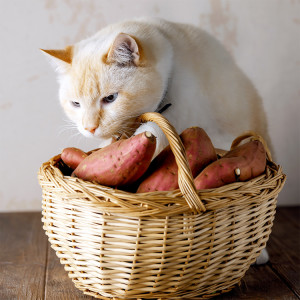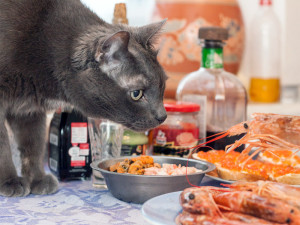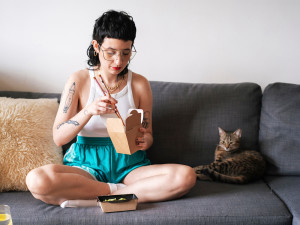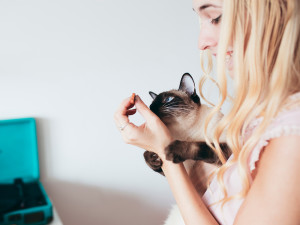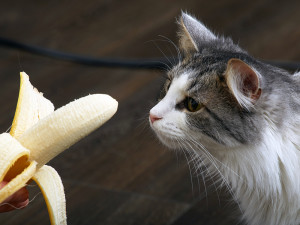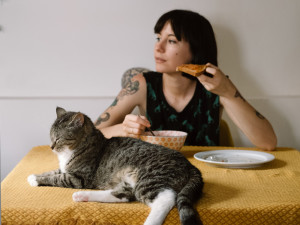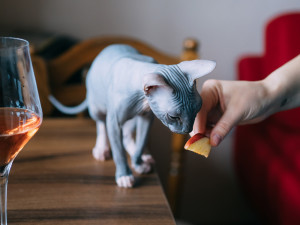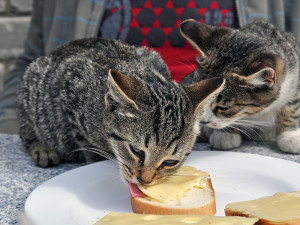Can Cats Eat Potatoes?
They just want a little bite...
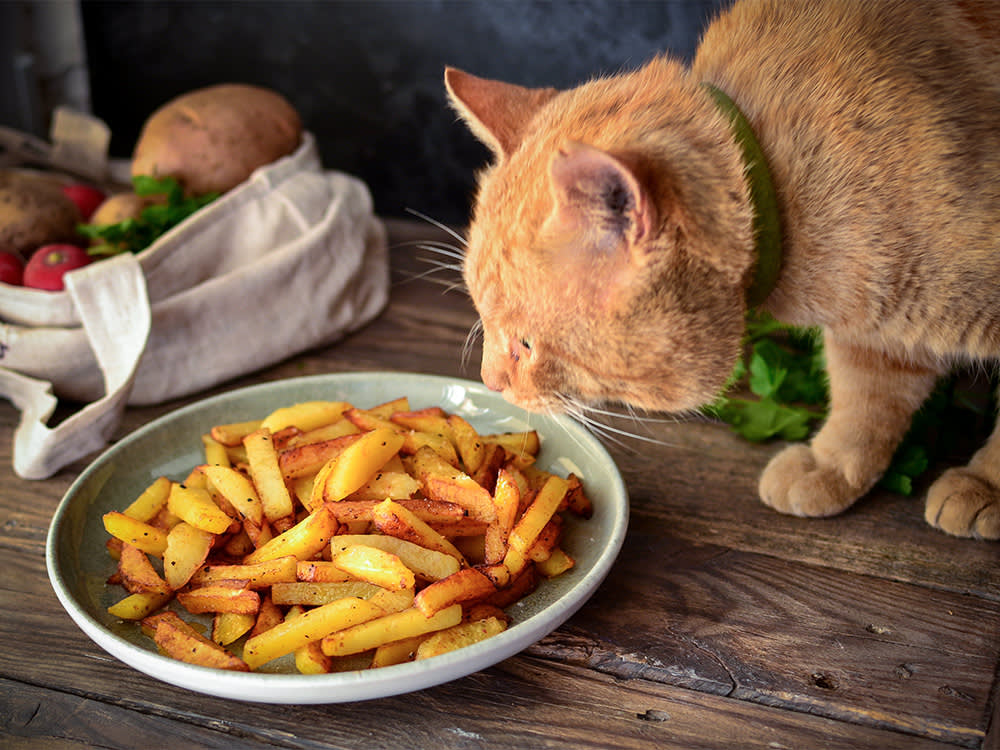
Share Article
The Latin name for the potato plant, Solanum tuberosum, translates to “soothing tuber,” and there are few foods that symbolize comfort food as consistently as potatoes. Whether you seek a warm bowl of mashed potatoes, a baked potato loaded with all the best toppings, or crispy french fries, most of us consume potatoes on the regular.
All these delicious potato options may pique your cat’s curiosity and have you wondering if your cat can eat potatoes, too. The answer is that while cooked potato is safe for cats in small amounts, it’s not a particularly healthy choice for them. Read on to learn more about sharing potatoes with your cat.
Nutrition facts about potatoes for cats
Potatoes grow underground as the tubers of the Solanum tuberosum plant. They are part of the nightshade family of plants, which also includes tomatoes, eggplants, and peppers. These plants originated in South America and are now grown world-wide as an important food crop. There are thousands of varieties of potatoes ranging in size, color, and flavor, and they share many of the same nutritional characteristics.
Potatoes are high in starchy carbohydrates and also contain fiber in their skins. Different potatoes also contain varying combinations of nutrients, including vitamins, minerals, and antioxidants. Cats can benefit from some of these nutrients; however, they should not eat a lot of carbohydrates in general.
Cats are obligate carnivores, which means they have different nutritional requirements than omnivores like humans or dogs. They generally need to consume foods higher in protein and fats and do not metabolize carbohydrates, starches, or sugars, as well as omnivores.
Are potatoes good for cats?
Some of the nutrients in potatoes are beneficial to cats. However, there are better sources of these nutrients for cats that will contain fewer carbohydrates and meet more of their dietary needs. As carnivores, their needs are quite specific and this makes it extremely important for them to eat a complete and balanced cat food diet. They cannot get all of their nutritional needs met and be their healthiest if they are eating a lot of table foods or other snacks that are not balanced.
That said, everyone likes to spoil their kitties, and the very occasional bite of potato or other safe table food is not problematic as long as it is really kept to a minimum. Some of the nutrients found in potatoes that are beneficial to cats include:
Fiber: The skin of the potato contains the bulk of its fiber content. While fiber is technically a carbohydrate, it is not digested but rather passes through the digestive tract providing certain benefits. It can help to bulk up the stool, prevent constipation, create feelings of fullness and support the good microbes of the gut.
Vitamins and minerals: Potatoes contain some important nutrients including potassium, B vitamins, iron, magnesium, and phosphorus. These nutrients play critical roles in the body including maintaining normal fluid balance and supporting healthy muscles, red blood cells, nerves, bones, teeth, and heart function.
Antioxidants: Potatoes also have potent compounds like anthocyanins and carotenoids, which may play a role in protecting the body against damage from free radicals. These compounds may help to slow the aging process, protect against certain cancers, and reduce inflammation. Purple and red potatoes have the highest levels of anthocyanin, while yellow and red potatoes have more carotenoids.
Can cats eat any part of the potato plant?
No; the plant itself is considered toxic. The leaves and stems of the potato plant contain a toxin called solanine. It is an alkaloid that can cause drooling, digestive upset, like vomiting or diarrhea, lethargy, and a slow heart rate. Cats should be kept away from the foliage to prevent ingestion.
Additionally, raw potatoes can contain solanine in the peel, particularly if they have turned green from exposure to light. Any green potatoes should be disposed of, as cooking does not neutralize the toxin, either. This same toxin is found in many plants of the nightshade family, including tomato plants. If you suspect your cat has been chewing on any plants in the nightshade family, be sure to contact your veterinarian right away, or go to the nearest emergency clinic if they have any signs of illness.
Are potatoes completely safe for cats?
Plain, cooked potatoes are safe for cats but not generally recommended as a healthy snack. Here are some of the important points to keep in mind before offering them a taste of your potato:
High in carbohydrates: Potatoes are high in starchy carbohydrates, which are quickly broken down by the body. Cats do not metabolize carbohydrates as well as omnivores, nor do they need them in their diet. If they eat too many carbohydrates, they are at risk for weight gain, as well as related complications like diabetes and arthritis.
Risk of solanine toxicity: Potatoes that have turned green, as well as all parts of the potato plant, contain a toxin called solanine that can make cats sick if they ingest it. They should not be allowed to chew on potato plants, and you should discard any green potatoes.
Other ingredients: Potatoes are often prepared with other ingredients to make them into delicious, decadent foods for us. However, many of these added ingredients are not safe for cats and may even be toxic. Be sure to share only plain, cooked potatoes with your cat. You should avoid any potatoes prepared with garlic, onions, lots of salt, oils, and/or high-fat dairy ingredients.
Other foods that are safe for cats
Plain, cooked shrimp are safe for cats in moderation.
Yogurt can also be safe in small amounts.
Peanut butter can be shared in small amounts, just keep these guidelines in mind.
Other foods that are dangerous
Chocolate is toxic to cats and should never be shared.
Grapes and raisins are also off-limits.
Garlic and other plants in the Allium family are also toxic to cats.
The bottom line: Can cats eat human food?
There are lots of human foods that are safe to share with your cat in moderation. Cats have very unique nutritional needs that should be kept in mind at the same time. Unlike humans and dogs, cats are obligate carnivores and need to eat a diet with higher amounts of protein and fats, with limited amounts of carbohydrates and sugars. There are also a number of foods that are toxic and/or unhealthy for cats, so always double-check that the food you want to share is safe for your cat to eat.
In order to provide optimum nutrition to your cat, it’s very important that the bulk of their calories come from a complete and balanced cat food diet. Snacks and treats should be limited to less than 10 percent of their total intake to ensure that they eat enough of the foods they need most and to avoid accidentally overfeeding them.
Many cats live fairly sedentary lives indoors, and they are at risk for gaining weight if they are overfed as well as inactive. Food can be a great motivator to help get your cat moving and enrich their daily lives with puzzle feeders and other interactive toys.
FAQs (People also ask):
How much potato can a cat eat?
A small bite-sized amount of plain, cooked potato is OK as an occasional treat, but they should not consume large amounts.
Is it OK to give cats potato?
Potato is not toxic for cats, but it is not healthy for them as it contains a lot of carbohydrates. Very small amounts are OK.
Why do cats like potatoes?
Cats may be curious about what their humans are eating, and they may like the texture and smell of potatoes, especially if they are cooked with high fat seasonings.
Can cats eat potatoes?
Cats can eat small amounts of plain potato but only as a very occasional bite-sized snack since it is high in carbohydrates.
Is potato good for cats?
No, potatoes are not considered good for cats because they’re high in carbohydrates.
Can cats eat potato plants?
No, potato leaves and all parts of the plant contain a toxin that can make them sick.
References:

Dr. Amy Fox, DVM
Amy Fox, DVM is a small animal veterinarian in New York City. A lifelong animal lover, Dr. Fox studied biology in college and then worked as a veterinary nurse before pursuing veterinary school at Cornell University. She has worked in many different settings including shelter medicine, emergency medicine, general practice, and animal cruelty and forensics. She is especially interested in nutrition, preventative medicine and care for senior pets. Dr. Fox also enjoys writing about veterinary medicine and teaching. In her free time she loves to cook, garden, and go for long runs.
Related articles
![Blonde woman holding cat trying to feed it ham]()
Can Cats Eat Ham?
Skip the green eggs, but ham is OK — with a couple caveats.
![A cat staring at a peeled banana]()
Can Cats Eat Bananas?
Gwen Stefani taught us how to spell it, but can we feed this fruit to our cats?
![A woman eating peanut butter toast with her cat laying on the table]()
Can Cats Eat Peanut Butter?
The sweet-and-salty treat is OK in moderation.
![A gray Sphynx cat sniffing an apple slice held out by her owner while standing on a table next to a glass of wine]()
Can Cats Eat Apples?
Yes, but the fruit might not hold much a-peel.
![Two grey cats eating swiss cheese off of slices of bread while sitting on a table]()
You Should Not Invite Your Cat to Your Fancy Cheese Party
Save the charcuterie for the humans.
![Cat eating from a plate of raspberries and blueberries]()
Can Cats Eat Blueberries?
Go ahead and serve up the superfood — with a couple caveats.

